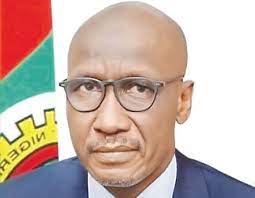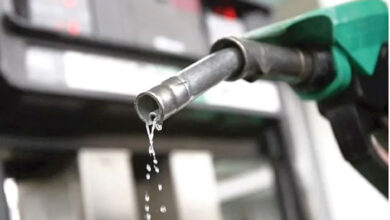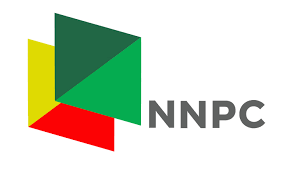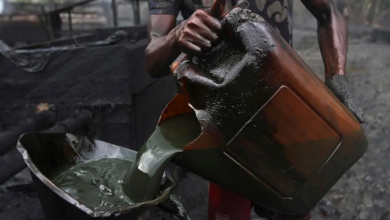Petrol Subsidy Ends 2022, FG Absolves Self From Gas Price Hike

Mele Kyari, GMD, NNPC
…Poor Nigerians to get N5, 000 monthly allowances – Minister
Group Managing Director Nigerian National Petroleum Corporation (NNPC) Mele Kyari has said the regime of fuel subsidy would become illegality by the year 2022 when it would come to an end.
Specifically, Kyari said by the end of February 2022, the law provides that Nigeria should be out of the subsidy regime.
He said the subsidy would have gone in 2020 but for some factors which made it impossible.
The NNPC boss spoke at the November 2021 edition of the World Bank Nigeria Development Update.
“There will be no provision for it legally in our system, but I am also sure you will appreciate that government has a bigger social responsibility to cater for the ordinary and therefore engage in a process that will ensure that we exit in the most subtle and easy manner,” he said.
Kyari assured that fuel subsidy removal would “definitely” be achieved in 2022 as it is now fully backed by law, and that the price of the product may range between N320 and N340 per litre.
At the moment, petrol (PMS) in Nigeria sells for N165, and giving the current market data, the commodity presently sells at between N165 to N170.
N5, 000 allowance
Also speaking at the event, Minister of Finance, Budget and National Planning Zainab Ahmed said in the place of fuel subsidy removal, the federal government would pay a monthly N5,000 transport grant to poor Nigerians.
This, she said, would target about 30 to 40 million Nigerians who make up the poorest population of the country.
The government has consistently argued in favour of fuel subsidy removal, contending that the proceeds would be used in funding critical infrastructure, a position canvassed by the International Monetary Fund (IMF).
The minister said: “The subsidies regime in the (oil) sector remains unsustainable and economically disingenuous.
“Ahead of the target date of mid-2022 for the complete elimination of fuel subsidies, we are working with our partners on measures to cushion potential negative impact of the removal of the subsidies on the most vulnerable at the bottom 40% of the population.
“One of such measures would be to institute a monthly transport subsidy in the form of cash transfer of N5, 000 to between 30 – 40 million deserving Nigerians.
“We are very optimistic that the recent developments in the oil sector, such as the Petroleum Industry Act (PIA) 2021, hopefully, the full reactivation of the 4 public refineries in the country, and the completion and coming on stream of the 3 private refineries under construction in 2022, would significantly boost contribution from the sector to our economic growth efforts.”
“I agree with the Report that with the expansion of social protection policies during the pandemic, the government has an opportunity to phase out subsidies such as the PMS subsidy while utilizing cash transfers to safeguard the welfare of poor and middle-class households,” the minister further said.
Gas price hike
In a related development, Minister of State for Petroleum Resources Timipre Sylva has said the federal government has no control over the price of cooking gas.
The minister said this while fielding questions from State House correspondents after a meeting with President Muhammadu Buhari where he formerly presented the Chief Executives Officers of Nigerian Midstream and Downstream Petroleum Regulatory Authority (NMDPRA), Mr Faruk Ahmed, and the Nigerian Upstream Petroleum Regulatory Commission (NUPRC), Mr Gbenga Komolafe.
He said, like crude oil, prices of gas are determined by global markets, stressing that efforts were being made to reduce the price to bearable level for Nigerians before Yuletide season.
Asked what was responsible for the hike in the price of cooking gas and what government was doing to address the situation, the minister said government cannot subsidise the product as it was fully deregulated.
“We must understand that cooking gas is not subsidised. It is already a deregulated commodity. So the price of cooking gas is not determined by government or by everybody in the industry. In fact, gas prices are determined internationally.
“And you all are aware that in Europe, today, gas prices have gone up, there was even crisis in Europe relating to gas prices. So the pricing of gas internationally now affects also the price of gas in the country.
“Apart from that, there are some issues around VAT charges on imported gas, and of course, taxes on imported gas, which we are handling. But of course, quite frankly, these taxes on imported gas, you must also juxtapose it side by side with the local producers of gas.
“So if you incentivize the importance too much, then you will also kill the local industry. And also, you don’t want to incentivize the local industry at the expense of the imports, because if incentivize the local industry at the expense of the imports, then you will not have enough gas produced within the country.
“So, these are the issues of balancing that the midstream and downstream regulatory authority are handling and I want to assure you that we are quite concerned. Mr. President also is very concerned. He is aware that the price of gas is high in the market, and we’re doing everything trying to see how we can bring down the price of gas especially as we approached the yuletide,” he said.
Nembe oil spillage
The minister also said President Buhari has also directed him to proceed to Nembe, Bayelsa state, to investigate the level of damage by the recent oil spillage in the area.
“And the question which is on the spillage in OML 29, we are quite aware of it. Unfortunately, it has happened. It is also one of the issues I discussed with the president as minister and he has actually asked us to go and visit the site to assess the situation and report back.
“Definitely, we are quite concerned with what is happening in Nembe and will be going there very soon; tomorrow in fact, to go and look at what is happening and report back.
“Mr. President is personally very interested and we have discussed it and he said we should go there and come back and report to him because environmental degradation issues are things that we are not going to condone, but of course we’ll work with the operators of OML 29 to ensure that this spillage is brought under control as quickly as possible,” he said.
Also speaking, the CEO of the Midstream and Downstream Petroleum Regulatory Authority, Mr Faruk Ahmed said payment of logistics in United States Dollars was responsible for fuel queues in some parts of the country.
“You see intermittent queues in some parts, maybe of Abuja and maybe the environs. Basically, what happened is that some of the depot owners are selling PMS above the official ex-depot price of N148; they are selling at N156, N157.
“And the reason they adduced is that they are paying for their logistics like shipping in US dollars, they’re paying for NPH, port charges and NIMASA charges in US dollars.
“They have to go to black market to source these US dollars. And that differential between the official and the black market they buy that is why they added about N9 to N10 to N15 and it depends on whether you are in Lagos, Calabar, Port Harcourt, or Oghara.
“Now we had a meeting the week before last Tuesday, the ninth, and the NPA was there represented and the DG NIMASA was there as well NNPC, major marketers were all there and we all agreed and resolved that NNPC excess capacity of their shipping their vessels will be chartered to all marketing companies will be charging in Naira so that NNPC now will go and source for converting US dollars through the CBN.
“As for the NIMASA and NPA charges, it was all agreed that they will revert to their supervising ministry to get direction on the receipt of these charges in Naira rather than US dollars and I understand the process of that engagement with their supervising ministry has already commenced.
“The NNPC from the 15th of this month has already converted to charging naira instead of dollar for their excess capacity charter to all marketing companies. So I believe with this, there will be no reason for the depot owners to increase their price beyond the official selling price of N148 naira.
“Now, we have been working tirelessly in the past few years, to sensitize our people to start using LPG for example. And they were making an effort to do so. And the production at that time was more like titling so, people are now interested in are working towards utilization of LPG, but then the production is not commensurate with the demand.
“And this is why we want to focus on investment in the area. Now a lot of major oil companies like their IOCs want to invest, but the pricing framework is an issue for them. So we’re working with the guidance of the Honourable Minister of State for Petroleum Resources to ensure that we’ll put the pricing framework that is attractive enough for the investors but at the same time is simple enough for the consumers, whether it is power, or industrial base, or the commercial sectors,” he said.
Also speaking, the CEO of NUPRC, Mr Komolafe said full implementation of the PIA had commenced.
“We have resumed in the office. Like for the Nigeria Upstream Petroleum Regulatory Commission, which I am the Chief Executive, I’ve been in office in the past 30 days. And in the process, we’ll be able to come up with six point agenda in line with prescriptions of the way the Act, with which we intend to transform and add value to the Nigeria upstream activities in a manner that we can optimize value across the value chain of the Nigerian upstream activities.
“Among these, is we intend to basically work towards enhancing our daily production, which at the moment, hovers around 1.6 million barrels a day, in fact, that is the data as of today. So, we intend to actually optimize that and that is put measures in place to do that in alignment with the IOCs and producers.
“We equally intend to put measures in place. We are actually initiating Public Private Partnership Initiative, which we tend to use to curb the issue of prospect which is acting negatively on financial revenue. We intend equally to ensure full digitization of the upstream activities in a manner that the nation will have advantage of monitoring on real time basis that is the activities of the upstream.
“And in addition as part of the agenda we intend to unfold, we are very conscious of the threat to investment in the upstream that is by the fact that when energy transition regime begins, as a matter of fact, we are the regulator in energy transition period, so, we tend to operate in a manner that will facilitate and enable investment in the industry in a manner that will mitigate the effects because we are conscious of the fact that there will be effects of that energy transition and part of the effect that has already been noticeable is funding challenges.
“So, we put in place strategic plans to mitigate the expected challenges of energy transition. So, by and large, this is the agenda we have put in place for us to optimize value for the nation in the upstream industry,” he said.
NNPC board
Meanwhile, President Buhari has directed the immediate suspension of the inauguration of the newly constituted board of the NNPC Limited, Secretary to the Government of the Federation Boss Mustapha has said in a statement Tuesday.
The SGF did not give any reason for the postponement of the event earlier scheduled for Wednesday (today).
“A new date for the inauguration of the Board will be announced in due course.
“We deeply regret inconveniences caused to members by this suspension, please,” he said.
Blueprint.ng





